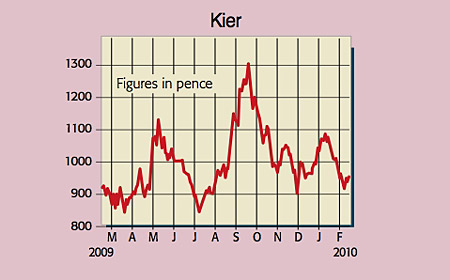
Anyone looking for mid- to large-cap stocks that pay decent dividends and trade at rock-bottom prices should look no further than the UK civil contractors. In spite of massive order books and solid balance sheets, the sector is unbelievably cheap. That’s because the City is fretting that state-funded projects will be axed once the government reins in spending after the general election.
True, budgets are likely to be cut. But I don’t think we’ll see anything like the Armageddon-style scenarios currently forecast by analysts. Investments in key areas such as energy, the 2012 Olympics, Building for Schools, hospitals and high-speed rail are, after all, key planks of Britain’s long-term future.
Enter Kier. Its main activities include private finance initiative (PFI) projects and home-building. But by far and away the biggest bread-winners are its construction (70% of sales) and services (another 20%) divisions. Both offer strong earnings potential. The services business has a £2.3bn order book. The construction unit sports a healthy £2.2bn backlog, providing cover for 96% of its targeted revenues for the year ending June 2010.
Kier (LSE: KIE), rated a BUY by Numis Securities
Better still, Kier is still bagging plenty of new work, including prestigious building contracts within the education arena (where it is a major player) and in healthcare, power and rail. It’s also recently secured two five-to-ten-year deals to repair and maintain council houses for local authorities. The bulk of that work is non-discretionary.
In financial terms the firm is in good shape too, with net cash of £92.5m as at the end of June, equivalent to 250p per share. The City is forecasting 2010 sales and underlying earnings per share (EPS) of £2.1bn and 102p. This puts the stock on a miserly price/earnings (p/e) ratio of 9.4. It also offers a chunky 5.7% dividend yield. So how much is Kier worth on a ‘sum-of-the-parts’ basis? I value its construction and services units on six times earnings before interest tax and amortisation (Ebita), the property division at £185m, and the PFI portfolio at £50.7m. After adjusting for its cash, head office costs and a £69m pension deficit (after tax), I get an intrinsic value of about £15 per share.
So what are the biggest risks? One is that, as the purse strings tighten, slim profit margins will come under attack as customers negotiate tougher terms. However, this is nothing new – the sector has long been operating in austere conditions, yet has a decent track record of maintaining profitability. And Kier has strong ties with many of its key customers. This should provide greater resilience if there is another economic wobble.
Other concerns include another drop in house prices and the usual risks associated with managing long-term contracts. On top of that, Kier was fined £17.9m by the Office of Fair Trading in September. That was for its alleged part in industry-wide price-fixing – albeit this decision is being appealed. But despite those worries, I’m not put off the stock. Thanks to the severity of the recent sell-off, Kier is a buy for both income-seekers and value investors alike. Interims are due out on 24 February.
Recommendation: BUY at 950p
• Paul Hill also writes a weekly share-tipping newsletter, Precision Guided Investments